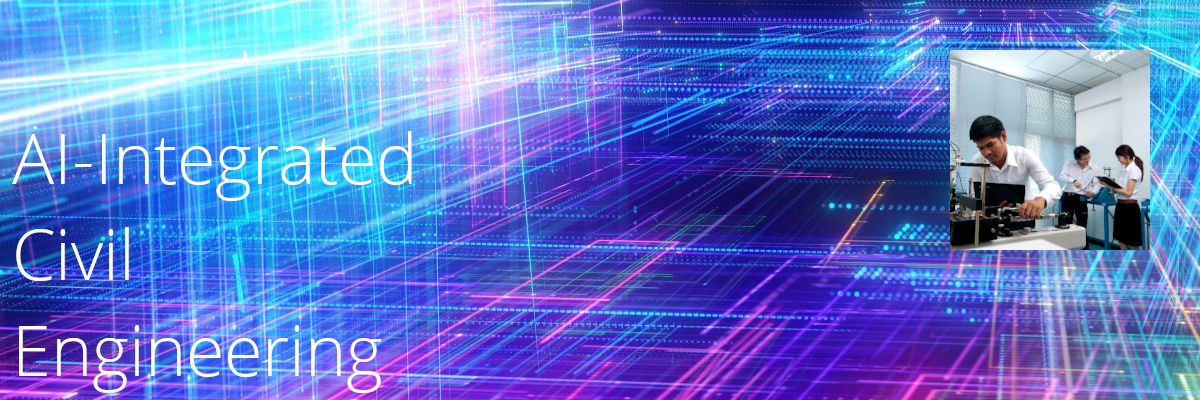AI-Integrated Civil Engineering

AI-Integrated Civil Engineering is a next-generation academic track co-developed by the Department of Civil Engineering and the Department of Computer Engineering at Kasetsart University.
It prepares students to become civil engineers who don’t just build structures — but design intelligent, sustainable, and human-centered systems for the cities of tomorrow.
Students will gain hands-on experience in smart construction, geospatial analysis, structural monitoring, environmental prediction, and infrastructure design using real-world data and cutting-edge AI tools.
What is AI x Civil Engineering?
Modern civil engineers must design for complexity, uncertainty, and urban dynamics. This program equips students to:
- Apply AI to Building Information Modeling (BIM) for Construction Management
- Monitor and analyze infrastructure with Structural Health Monitoring (SHM) and digital twins
- Apply GeoAI to analyze spatial data
- Model floods, traffic, and urban environments with AI-based simulations
- Advance Construction Material Science with sustainable, AI-designed mixtures
- Design Human-Centered Infrastructure by analyzing mobility and behavioral data from sensors and mobile devices
Program Overview
- Bachelor’s Program: Bachelor of Engineering in Civil Engineering (International Program) and Bachelor of Engineering in Survey Engineering and Geographic Information (Special Program)
- Master’s Program: Master of Engineering in AI-Integrated Engineering (Regular Thai curriculum)
- First intake: Academic Year 2027
- Number of Students:
- 15 Civil Engineering (International Program)
- 10 Survey Engineering and Geographic Information (Special Program)
- Admission Channels: TCAS1 (Portfolio), TCAS2 (Quota)
- Not available in regular tracks
Program Highlights
- Real-world integration of AI and civil works for smart and resilient infrastructure
- Collaborative courses with Computer Engineering and access to smart research labs
- Capstone projects in partnership with government and industry agencies
- Focus on urban data, environmental modeling, and human-centered design
- Tools: Machine Learning Platforms, cloud-based BIM, GIS, Python
What You’ll Learn
Students will master structural engineering enhanced with AI for predictive maintenance, learning to monitor and analyze infrastructure health using advanced computational methods. The program integrates traffic and transportation engineering with AI for traffic optimization, enabling students to design intelligent transportation systems that adapt to real-time conditions.
The curriculum covers survey engineering combined with GeoAI applications for spatial data analysis, teaching students to extract meaningful insights from geographic information systems and remote sensing data. Students will learn construction management enhanced with AI for cost and schedule risk assessment, providing tools to optimize project delivery and resource allocation.
The program also encompasses urban planning with AI-informed behavioral modeling, preparing students to design human-centered infrastructure by analyzing mobility patterns and behavioral data from sensors and mobile devices. This comprehensive approach ensures graduates can tackle the complex challenges of modern civil engineering while leveraging artificial intelligence for smarter, more sustainable solutions.
Sample Capstone and Research Topics
- AI-driven predicting bridge fatigue and concrete crack
- Structural Health Monitoring (SHM) by AI and Virtual Reality (VR)
- Skeleton-based AI for Construction Machine Monitoring
- AI-based early warning systems and modeling
- Traffic congestion prediction using mobile + CCTV data
- UAV-based construction monitoring and progress tracking
- AI-driven sustainable infrastructure design for urban heat and noise mitigation
- AI in surveying process of land measurement
Industry & Research Partners
- Smart City Innovation Labs
- Government agencies and private sector
- AI research groups at Kasetsart University
- Civil Engineering technology companies
4+1 Pathway
- Students must meet academic requirements by their 3rd year by taking AI foundational courses.
- Students start enrolling Master’s courses also in the 4th year. (See information for the M.Eng in AI-Integrated Engineering program.)
- 4th-year project linked to Master’s research in the 5th year.
- Two degrees (B.Eng. + M.Eng.) in 5 years for future professionals.
The detailed study plan will be available soon. Read more about the undergraduate AI core courses and the Master program.
Career Opportunities
| Field | AI Application Area |
|---|---|
| Structural Engineering | Predictive maintenance, fault detection |
| Transportation Eng. | AI for traffic simulation, route optimization |
| Surveying/Geospatial | GeoAI + spatial data analytics |
| Construction Management | Cost/schedule risk analytics, site monitoring |
| Urban Planning | AI-informed design for smart cities |
What Makes This Program Unique?
- Pioneering curriculum linking civil systems with AI and urban data
- Access to smart infrastructure projects and environmental datasets
- Cross-disciplinary collaboration and mentorship
- Focus on digital tools and sustainability in real-world applications
Enrichment Activities
- Urban AI bootcamps and smart city workshops
- Joint projects with governments agencies and industry partners
- Research assistantships on digital twin or SHM platforms
- UAV and LiDAR training for field applications
- Capstone exhibitions and publication opportunities
AI Foundation Courses (Undergraduate Level)
Students will take the following courses during their first 3 years as undergradute students.
- Applied AI for Engineering (01204162)
- Mathematical Foundations for AI Engineers (course under development)
- Programming Concepts for Data Processing and Analysis (course under development)
See course descriptions.
Equivalent internal courses from Civil Engineering may be submitted for equivalency review.
Distinctive Graduate Outcomes
Graduates of this program will:
- Design smarter infrastructure using real-time data and AI
- Contribute to sustainable and people-centered cities
- Operate across disciplines from structural mechanics to urban intelligence
- Become leaders in smart construction, environmental modeling, and infrastructure analytics